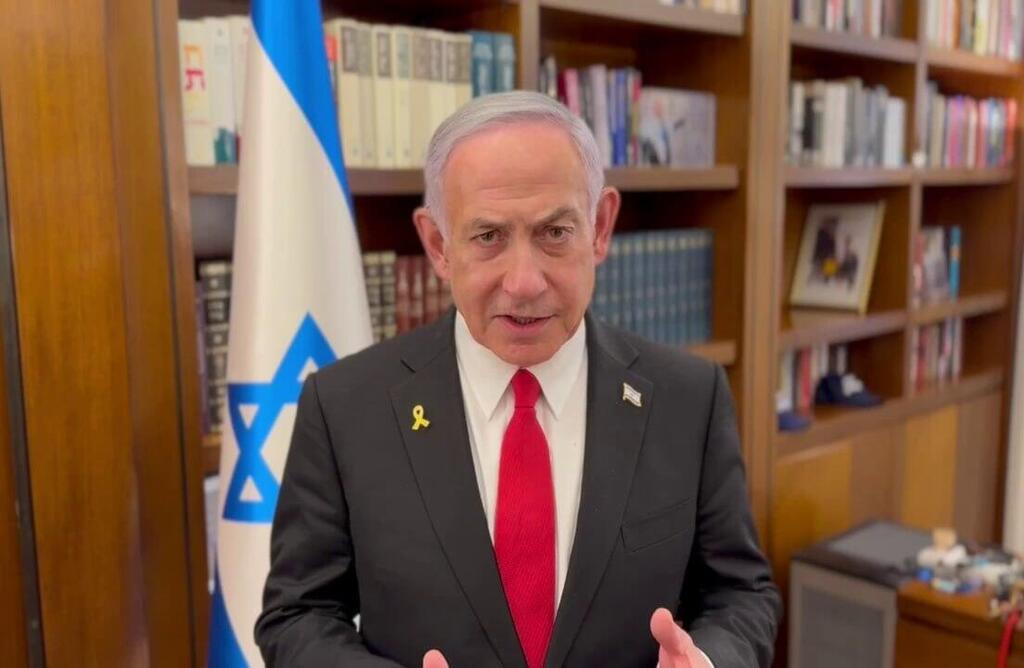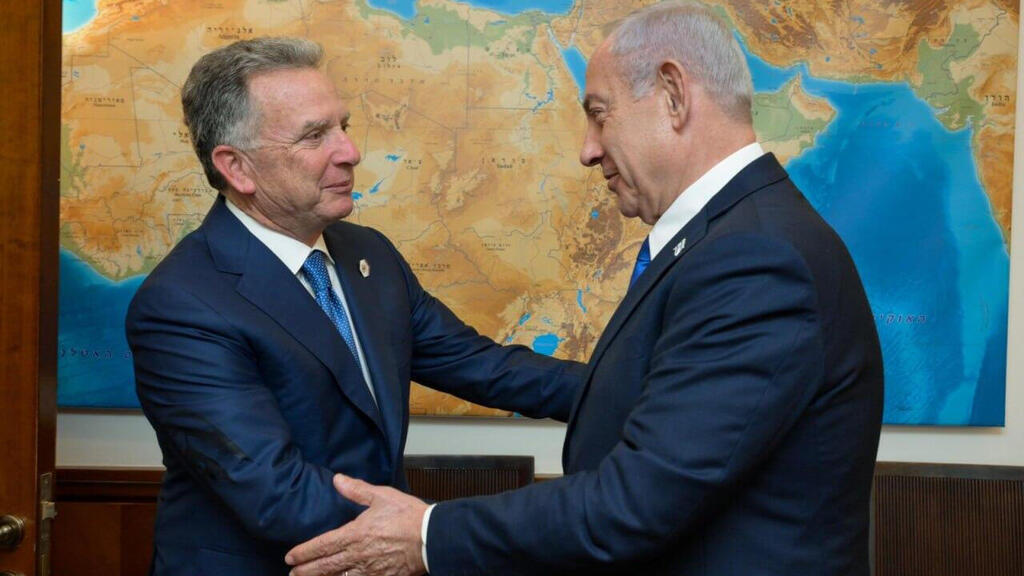Prime Minister Benjamin Netanyahu said on Tuesday that Israel is on the cusp of a dramatic expansion of the Abraham Accords.
In a video post Netanyahu said that after the victory over Iran, Israel now has an opportunity to expand the accords. "We have an opportunity and it must not be waisted. we must not waist even one day," Netanyahu said.
Earlier officials were surprised when U.S. special envoy to the Middle East, Steve Witkoff, said Wednesday night: “We think we will have some pretty big announcements on countries that are coming into the Abraham Accords.” An Israeli source told ynet: “It’s not yet clear who Witkoff meant, and we aren’t aware of any concrete developments.”
But behind the scenes—particularly in the Prime Minister’s Office—people understand the Americans’ intentions, at least in terms of the plan they’re crafting.
Assuming that Witkoff was not speaking randomly, we can begin to guess the shape of the expected normalization. There’s no doubt that the war with Iran marks a turning point—the Middle East and Muslim-majority states have realized a significant shift: Uncle Sam is once again the world’s sheriff. The heavy blow dealt to Tehran—even if its nuclear program wasn’t completely destroyed—sends a crucial message to moderate Muslim states: it’s time to choose a side, and choose quickly.
4 View gallery


Mohammed Bin Salman, Donald Trump. Benjamin Netanyahu
(Photos: Dana Koppel; Carlos Osorio, Bandar Algaloud/Courtesy of Saudi Royal Court/Handout via Reuter/ Bashar Taleb / AFP, Jack Guez/ AFP)
Those aligned with the Axis of Evil will want to distance themselves, and fast. After suffering blows over the past year, everyone has learned what happened to those sheltered by Iran: Assad’s regime collapsed; Hassan Nasrallah was targeted and Hezbollah’s capabilities were significantly diminished; the Houthis were left in ruins and their commander was killed or severely injured at an arms trafficking event; Iraqi militias were decimated—and, above all, Iran itself is licking its wounds after losing around 20 senior commanders.
The U.S. plan explicitly envisions peace through strength. This is President Trump’s strategy—he likely expected regional states to line up after the strike on Iran’s nuclear facilities. But reality is more complicated, and it certainly won’t happen overnight.
No normalization steps are likely before the conflict in Gaza ends, and it is therefore likely that Trump will now turn his full attention to Gaza and push for a hostage deal as the condition for ending the war. This would be a major milestone, almost essential for normalization. Trump and his team are preparing for the post-war phase, positioning both Prime Minister Benjamin Netanyahu and Israeli public opinion. It’s no coincidence that Trump’s dramatic post Wednesday night, calling to drop Netanyahu’s trial, may be part of the broader strategy. There are no free gifts—Netanyahu will have to pay, in Israeli political currency.
Everyone is waiting for Riyadh
Assuming the Gaza war really is nearing its end, there are a few early candidates could join the Abraham Accords. The most likely first mover is Azerbaijan, which has strategic ties with Israel, and U.S. influence may bring Armenia as well. Azerbaijan, a Shiite Muslim country, already maintains diplomatic relations with Israel, though mostly symbolically. Witkoff visited there before and hinted at it. Armenia also has relations with Israel—but they are tense.
In the Middle East, Syria seems the most plausible next candidate. National Security Adviser Tzachi Hanegbi mentioned the possibility of normalization discussions with Syria—and even Lebanon—in a Knesset Foreign Affairs & Defense Committee briefing. Syrian President Ahmad al‑Sharaa understands that joining the Accords could bring international recognition and perhaps sanctions relief after Assad’s fall.
That’s not to say embassies will open in Damascus tomorrow, nor that Israelis will soon enjoy hummus in the capital’s markets. Still, an agreement between the two governments is plausible. Israel is already in contact with al‑Shara’s regime; both share a mutual interest in preventing an Iranian‑Hezbollah presence in Syria.
With Lebanon, however, the situation is far more complex. The Lebanese public isn’t ready for normalization, but perhaps, at most, a non‑belligerence pact.
Saudi Arabia is the pivotal state the Americans most want to join. Its accession could trigger a flood of follow-on agreements: Indonesia, Qatar, Kuwait, Oman—and several African Muslim-majority nations like Niger, Mali, Djibouti. Some even speculate Indonesia might precede Saudi Arabia, but everybody will be watching Riyadh. The key question: will Saudi agree only if the Gaza war ends, or will they also demand a formal Palestinian state as part of the conditions?
Netanyahu currently seems incapable of signaling openness to a future Palestinian state—especially as long as Smotrich and BenGvir remain in his government. If Netanyahu wants to leave a legacy, he may even have to part ways with his hard‑right allies. It’s already clear this is bigger than ending the Gaza war—and it seems likely Trump might try to bring Israeli opposition figures on board. Don’t be surprised if Bennett, Lapid, or Gantz are invited to the White House later to help Netanyahu craft a “political parachute” to free him from far‑right influence.
But reality is more complicated than Trump’s dramatic rhetoric, and that of his envoy Witkoff. Hamas remains 100% obstinate. Without firm guarantees for a war-ending deal, Hamas will block an interim agreement; without an interim agreement there is no ceasefire and no hostage release. Perhaps after the strikes on Iran, the U.S. and Israel will reconsider and propose a comprehensive, single‑step deal. With the momentum from the Iran operation, Netanyahu could indeed pass such a deal in his government.
The telltale signs
As early as last March, a political insider close to the prime minister told ynet: “Netanyahu fears a hostage deal ending the war could hurt his coalition, so he intended to link it to the Saudi deal—a major package that couldn’t be signed without a Gaza solution, and might include the issue of control over the Strip.” Netanyahu also wanted to link the deal to normalization, but gaps remained.
Reports suggest that such a package has been on the table for many months—but it involves an Israeli pullback from Gaza. Now, after the successes against Iran, signs are growing that more countries will join the Accords—subject to specific conditions.
4 View gallery


Benjamin Netanyahu confers on the floorof the kNesset with Itamar Ben-Gvir and Bezalel Smotrich
(Photo: Ohad Zwigenberg/AP)
First, consider Trump’s late-night post calling to drop Netanyahu’s trial, to which Netanyahu responded by thanking him for his support. Trump wrote: "Bibi Netanyahu’s trial should be CANCELLED, IMMEDIATELY, or a Pardon given to a Great Hero, who has done so much for the State." As stated earlier, Trump doesn’t give gifts for free; this is part of a larger, likely coordinated, regional strategy—and Netanyahu is part of it.
Trump hasn’t hidden his goals: since declaring the ceasefire with Iran, he’s become impatient with Israel—especially over the ongoing war in Gaza. In Trump’s view, the vision is clear: end the war, bring back the hostages—then move toward normalization with Saudi Arabia and extend the Abraham Accords to more regional—and perhaps international—partners. Witkoff even hinted last night that a “deal with Hamas is closer than ever.”
Get the Ynetnews app on your smartphone: Google Play: https://bit.ly/4eJ37pE | Apple App Store: https://bit.ly/3ZL7iNv
In this context, Trump’s call to drop the trial is not unrelated—but may be part of a “package deal”: Trump offers Netanyahu public and possibly practical support, and in return Netanyahu is expected to do everything possible to end the Gaza war and advance regional objectives. This may just be the first shot in a broader campaign yet to unfold.
Opposition leader Yair Lapid hinted as much Thursday morning in an interview with ynet: “With all due respect to Trump—he shouldn’t interfere in the judicial process of a sovereign country. I assume it’s a concession he’s giving Netanyahu because he intends to bend him regarding Gaza and ending the war. That suits Trump.”
Meanwhile, responses to the post that rattled the political system are underway. Attorney Amit Hadad, Netanyahu’s lawyer, petitioned the Jerusalem District Court to delay his client’s testimony over the next two weeks—arguing that it’s a critical period nationally and diplomatically, and that the Prime Minister’s attention is required for “top-tier tasks,” chiefly directing the Gaza war and its regional ramifications.
'The era of piecemeal deals is over'
On Thursday, against the backdrop of the Iran ceasefire and the ongoing Gaza conflict, hostage families issued a statement expressing anger at the government and calling to “advance a comprehensive agreement now.”
Fearing another round of piecemeal deals with brutal list-making (deciding who will be released after nearly two years in captivity and who remains in Hamas custody), Vicky Cohen—mother of hostage Nimrod Cohen—said: “He’s rotted in tunnels for 629 nights and days. After so long, I’ve run out of words. It’s time for a comprehensive deal—the era of partial deals is over.”
Udi Goren, cousin of the fallen soldier and hostage Tal Haimi, said: “We’ve achieved military gains, but failed politically.”
Einav Tsengauker, mother of hostage Matan Tsengauker, noted: “If it could end with Iran, it can end with Gaza.” She appealed directly to President Trump, asking him to “decide to bring my son home from the tunnels. End the Gaza war now.” She added: “Why are they not willing to end the war in Gaza, once Hamas has been defeated?”
First published: 19:12, 06.26.25




